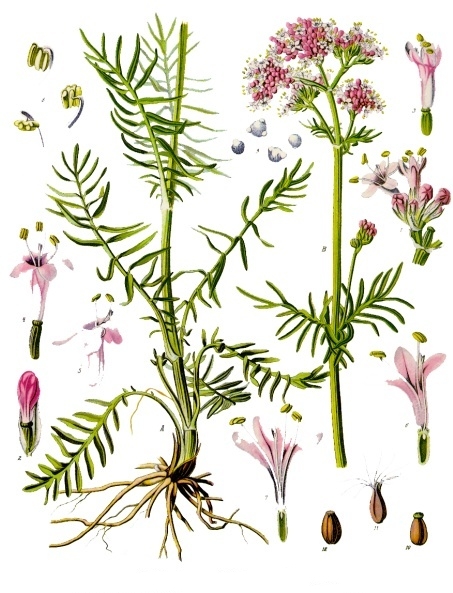It has been a long, long time since I did one of these, but a long time ago, I started a series about plants, trees and herbs which are mentioned in Hellenic mythology. You can find previous installments here. Today, I want to talk about valerian (root).
Valerian (Valeriana officinalis, Caprifoliaceae) is a perennial flowering plant native to Europe and Asia. In the summer when the mature plant may have a height of 1.5 metres (5 ft), it bears sweetly scented pink or white flowers. Crude extract of valerian root may have sedative and anxiolytic effects, and is commonly sold in dietary supplement capsules to promote sleep.
Valerian has been used as a medicinal herb since at least the time of ancient Greece and Rome. Hippocrates described its properties, and Galen later prescribed it as a remedy for insomnia.
The name valerian or Valeriana was not mentioned by Hippocrates, Theophrastus, Pliny, or Dioscorides, the major Greek authors from 500 B.C. until 100 A.D whose writings survive. Valerian first appeared in the literature sometime around the 9th or 10th century, but it is not certain whether the word originated from an earlier time in Greece, during the Roman Empire or later from Anglo-Saxon medicine or Arabian medicine (9th-12th centuries). As early as 1515 Valeriana was repeatedly said to be synonymous with fu or phu.
Although not a major medicinal plant in the Hellenic pharmacopoeia, valerian was valued as a bitter compound with digestive and diuretic uses. Its aroma was described as pleasant by these authors and it was often included in perfumes—certainly not the case for today’s users who often complain about the pungent, "dirty socks" odor of valerian.
Valerian (Valeriana officinalis, Caprifoliaceae) is a perennial flowering plant native to Europe and Asia. In the summer when the mature plant may have a height of 1.5 metres (5 ft), it bears sweetly scented pink or white flowers. Crude extract of valerian root may have sedative and anxiolytic effects, and is commonly sold in dietary supplement capsules to promote sleep.
Valerian has been used as a medicinal herb since at least the time of ancient Greece and Rome. Hippocrates described its properties, and Galen later prescribed it as a remedy for insomnia.
The name valerian or Valeriana was not mentioned by Hippocrates, Theophrastus, Pliny, or Dioscorides, the major Greek authors from 500 B.C. until 100 A.D whose writings survive. Valerian first appeared in the literature sometime around the 9th or 10th century, but it is not certain whether the word originated from an earlier time in Greece, during the Roman Empire or later from Anglo-Saxon medicine or Arabian medicine (9th-12th centuries). As early as 1515 Valeriana was repeatedly said to be synonymous with fu or phu.
Although not a major medicinal plant in the Hellenic pharmacopoeia, valerian was valued as a bitter compound with digestive and diuretic uses. Its aroma was described as pleasant by these authors and it was often included in perfumes—certainly not the case for today’s users who often complain about the pungent, "dirty socks" odor of valerian.


No comments:
Post a Comment